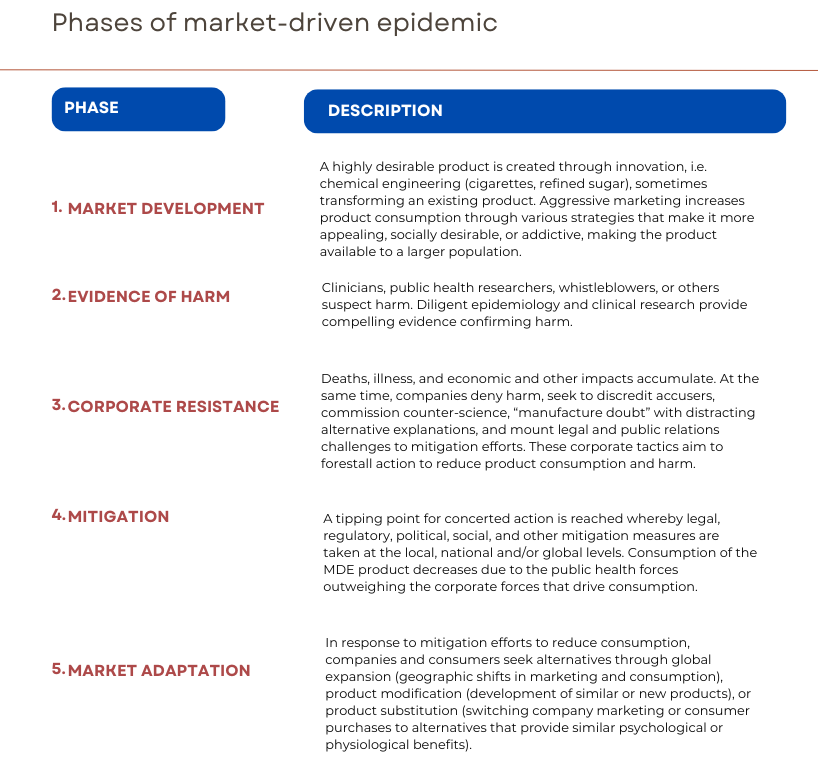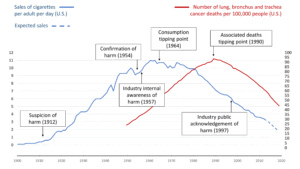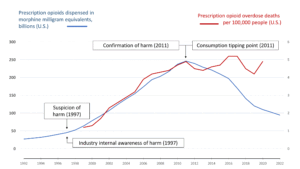The Center for Policy Impact in Global Health (CPIGH) is hosting a new initiative led by Dr Jonathan Quick, Associate Faculty Member of CPIGH, that focuses on market driven epidemics.

What are Market Driven Epidemics (MDEs)?
Unhealthy use of consumer products such as tobacco, sugar-laden foods, prescription opioids, ultra-processed foods, and firearms contribute to an estimated one million annual deaths in the U.S. and at least 23 million annual worldwide deaths. Such products contribute to heart disease, obesity, diabetes, cancers, and drug addiction and cost economies and health systems trillions of dollars.
We define market-driven epidemics (MDEs) as “a significant increase in the consumption of a consumer product whose overuse or misuse has been proven to cause death, disability, and other harmful effects; whose consumption has been accelerated by aggressive marketing;
“whose harmful effects are hidden, denied, or otherwise minimized by producers; and for which effective mitigation is actively resisted by producers”[1].
MDEs represent a distinct dynamic within the broader landscape of commercial determinants of health (CDoH). The distinguishing feature of the MDE methodology is its core focus on the question: “What does it take to significantly and sustainably bend downward the epidemic curves of unhealthy product use and consequent harms?” The MDE methodology is thus an action-oriented public health approach, which builds on prior successful mitigation strategies to quicken epidemic response activities. MDEs are behavioral epidemics that have been found to require a combination of interventions to reduce a product’s unhealthy use by changing the behaviors of producers, their supply chains, and individual consumers.
The Market-driven epidemics approach looks at this dynamic through a 5-phase framework:

In past MDEs, the time elapsed between phases has been as long as decades, during which people fell ill and passed away. By identifying which phase an emerging MDE is in, we can see what type of actions in the past have progressed the MDEs between phases and employ those to save lives by avoiding this lag and sustainably decreasing product consumption and harm.
Key Phase Events:
We have identified key phase events that mark the progression of an MDE. Such events (not in requisite order) are: suspicion of harm, confirmation of harm, industry internal awareness of harm, industry public acknowledgment of harm, consumption tipping point, and associated deaths tipping point.
Tobacco
Considering company responsibility in making market-driven epidemics, it is helpful to see, for example, how much time elapsed between the industry internally knowing their product is harmful and when (or if) they acknowledged its harm on a graph showing the lives lost between these events occurring. tellus, luctus nec ullamcorper mattis, pulvinar dapibus leo.
Sugar
It is essential to identify what events successfully catalyzed a sustained decrease in MDE product consumption. If there is an ongoing MDE where consumption has not been bent, what worked about those key events in the past? Could those events be mimicked with the emerging MDE in the present?
Rimányi E, Quick JD, Yamey G, Immurana M, Malik VS, Doherty T, et al.
Jafar Z, Quick JD, Larson HJ, Venegas-Vera AV, Napoli PM, KS Meena, et al.
5-phase framework for tobacco, sugar, opioids.
Rimányi E, Quick JD,
“Products Can Harm People for Decades Before Companies Change. Here’s How to Stop Them.” TIME, 9 August 2024. Jonathan D. Quick, Gavin Yamey, and Eszter Rimányi.
“Companies keep selling harmful products – but history shows consumers can win in the end.” The Conversation. 30 Sept 2024. Jonathan D. Quick, Eszter Rimanyi.
“The Leading Voices in Food” Podcast E258: Do ‘market driven epidemics’ drive your food choices? Hosted by: Kelly Brownell, Sanford School of Public Policy, Duke University. December 18, 2024.
“Conversations on Healthcare” Radio Podcast series, Episode 6. Aired November 24, 2024 on Duke radio station WXDU. Discussed tobacco use in youth, the science behind compulsive overconsumption, and what individuals can do to compulsively consume less.
Challenges and Responses to Market-Driven Epidemics – Forward Pathway_2024
August 24th 2024
Forward Pathway
Dynamics of combatting market-driven epidemics: Insights from U.S. reduction of cigarette, sugar, and prescription opioid consumption: Overview of attention for article published in PLOS Global Public Health, July 2024
Think Global, DUKE
040 Trent Hall, plus Zoom webinar
Feb 19, 2025 12:00 PM
From Marlboro to Meta: Combatting the Health Impacts of Market-Driven Epidemics






